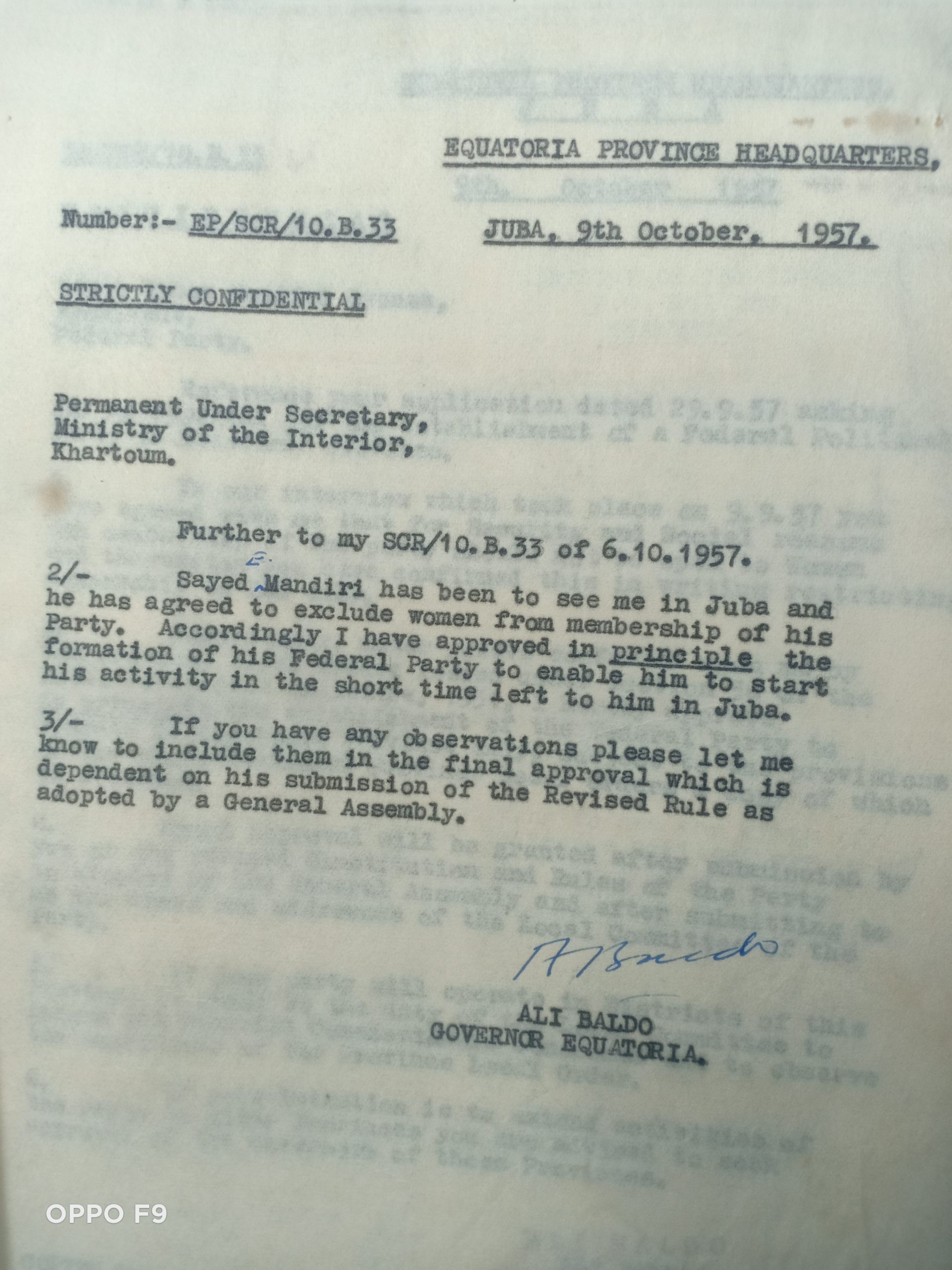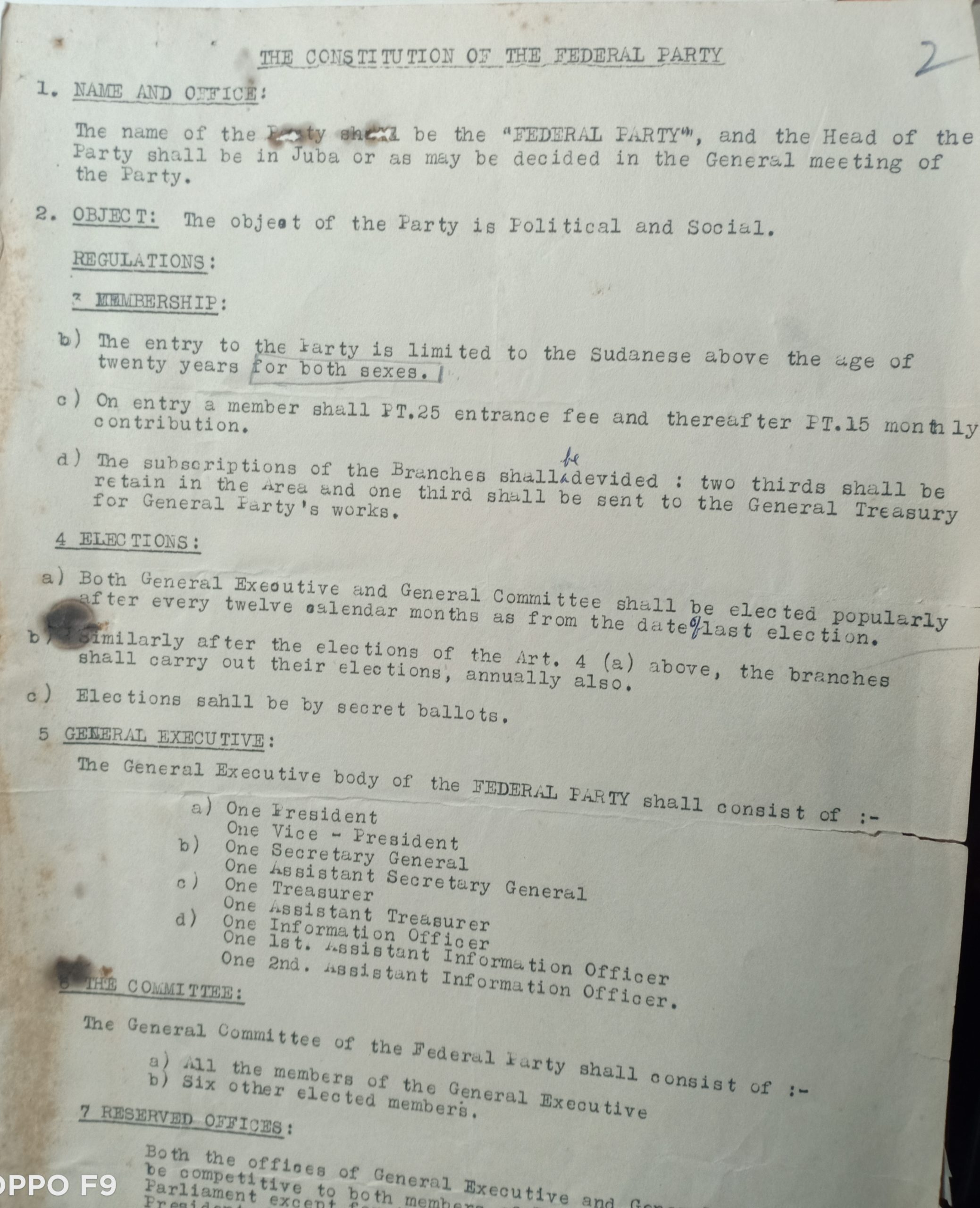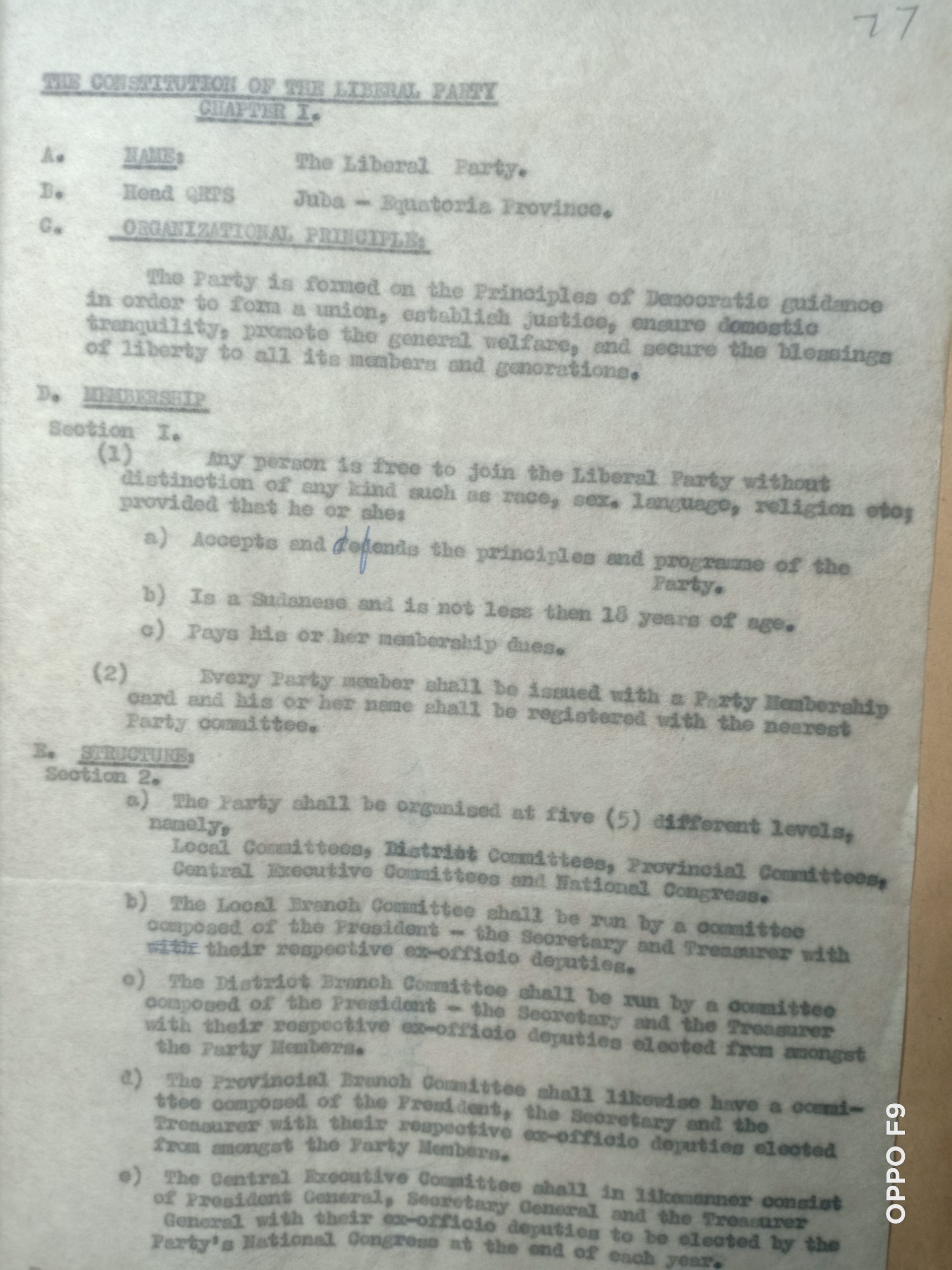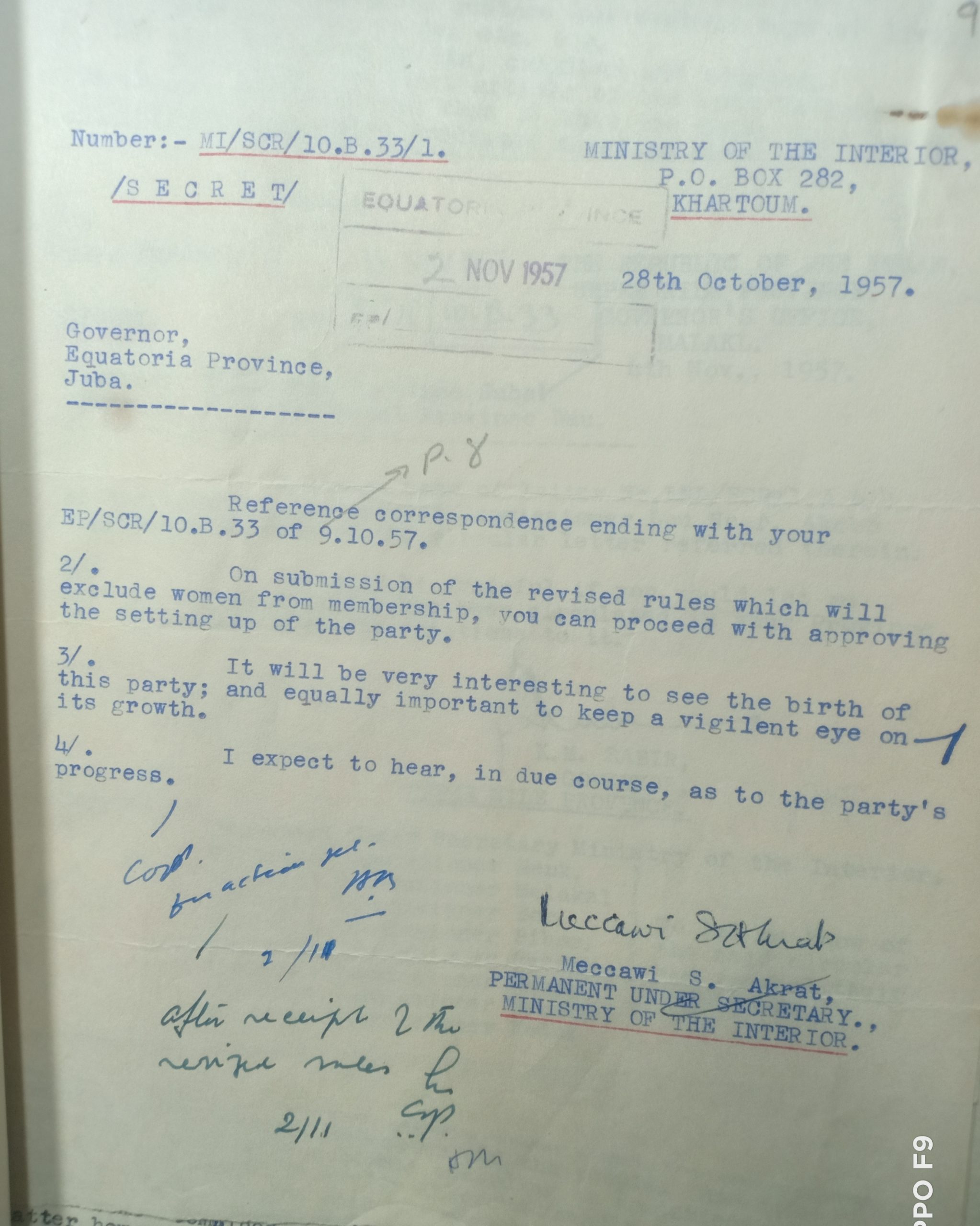Yosa Wawa, Associate Professor, University of Juba
The Rift Valley Institute works in partnership with the Ministry of Culture, Museums and National Heritage (MoCMNH) on the preservation and digitization of the South Sudan National Archives (SSNA). Under the current project, funded by the Government of Norway, through UNESCO, various activities are underway to showcase the information available in the archives to a wider audience. RVI and the MoCMNH are collaborating on a range of outreach activities including radio shows (Tarikh Tana), school study and discussion projects and social media outreach.
Archives emerged at various periods in the course of modernity as paperwork came to dominate bureaucratic processes of administration. Thus, an archival institution took the shape of collective memory, heritage, and identity. The foundation stone of the South Sudan National Archives (SSNA) were laid during Sudan’s condominium period. Now the SSNA contains thousands of files which are bastions of authenticity for serious historical study.
Files contained in archives, including the SSNA, provide neutral facts which the historian, in the process of writing history, interprets according to his or her speculation, and the conceptual framework of his or her research. I am a historian at the University of Juba, School of Education. I find it my duty to look at various documents in the SSNA, partly to improve the quality of my teaching and research.
It was on one of my many visits to the South Sudan National Archives, while looking at various Southern Sudanese political parties 1953-1965, that I was surprised to find a short letter written by one Ali Baldo, the then Governor of Equatoria, to Permanent Undersecretary, Ministry of Interior, Khartoum, on October 9, 1957 (see below) about an attempt to found the Federal Party. The registration of the Federal Party could not be allowed in the Sudan under the pretext of including women in politics.

According to the Constitution of the Federal Party Article 2b (attached below), the party is open to all Sudanese above the age of twenty to join irrespective of sex.[i] When the Federal Party’s registration was being frustrated, the Liberal Party, by contrast, was being given a free ride. In the constitution of the Liberal Party, Article D1, any person over eighteen is free to join the without distinction of any kind such as race, sex, language, and religion provided that he or she is not less than 18 years.[ii] Perhaps sensing that the Liberal Party was seen by those in power as nothing more than a Southern Sudanese party, while the Federal Party appealed to western and eastern parts of the Sudan, the authorities made it difficult for it to be registered.
Ezbon M Gwonza, the promoter of the Federal Party, negotiated this issue by agreeing to revise the Federal Party’s constitution. He might have found consolation in one of the fathers of African freedom fighter, Kwame Nkrumah, when he said ‘Seek ye first the political kingdom, and all else shall be added unto you’, by agreeing to exclude women from the Federal Party or removing article two.
Accordingly, in the new constitution of the Federal party, Article No. 2 states that the Federal Constitution should embody Legislature, Executive and Judiciary.[iii] No mention was made about the target population the party hopes to recruit. It is hard to tell whether the author(s) of the constitution wanted to confuse the watchful eye of the government with this new wording. It is a far cry from federalism, but whatever it was it bore the results that the promoters of the party wanted. Meccawi S. Akrat , Permanent Undersecretary, Ministry of Interior, wrote to the Governor of Equatoria province approving the establishment of the party on 28 October 1957.[iv]



The authorities in Khartoum or Juba at that time in history should have known better about the mind of the South Sudanese irrespective of gender. Whatever was behind the authorities in Sudan’s attempt to disapprove the registration of the Federal Party, the South Sudan woman did not play a subordinate role to men in the country’s long history of struggle for independence.[v] In the civil war of the 1960s, when there was almost no external support for the Anyanya freedom fighters, they were involved in collecting food-stuff for the fighters who were at the frontline.[vi] During the Sudan People’s Liberation Movement led war of the 1983 to 2005, there were people like Dr Anna Ito who left the university lecture halls to take combat roles in the forests of South Sudan. Earlier, many girls from various Vernacular Teacher Training Institutes took part in some of the student protests regarding changes to various educational policies soon after Sudan’s independence.[vii]
In South Sudan, women have been noted for their roles in ensuring that their voices have been heard. The leadership in South Sudan has not attempted to exclude the woman in the struggle or management. Article 16 of the Constitution of the Republic of South Sudan[viii] gives women the same rights as men—the right to equal pay for equal work and other related benefits with men and the right to participate equally with men in public life. After independence in July 2011, South Sudanese woman and others allied to them were asking for a 25 per cent representation in Government and other public sectors.
With this exposure, all researchers have been encouraged to visit the South Sudan National Archives to access historical information. Like my accidental finding, there are various types of information which can be of interest to people of different backgrounds. At the moment the South Sudan National Archives is working with the Rift Valley Institute, Republic of South Sudan Ministry of Culture, Museums, and National Heritage, and UNESCO in the preservation and digitization of all documents. This has been possible with financial support from the Norwegian Government. The members of staff of the Archives are not only knowledgeable but helpful. They can help one to find relevant files in addition to their usual work of arranging, describing, digitizing and preserving documents. When you are in South Sudan National Archives, you are rarely left alone to confront the mass of information unaided.
Yosa Wawa (PhD) is Associate Professor of history and the Head of the department of history at the School of Education in the University of Juba. He is an accomplished author and researcher in the field of history in the Sudan. He has conducted extensive research in the South Sudan National Archives both independently and as part of the South Sudan National Archives Outreach Programme to highlight the need for South Sudanese researchers and academic to use the resources at the archives.
[i] South Sudan National Archives. Equatoria Province EP 110.B.33
[ii] South Sudan National Archives . Equatoria Province EP110.B.23
[iii] South Sudan National Archives. Equatoria Province EP 110.B.33
[iv] South Sudan National Archives. Equatoria Province EP 110.B.33
[v] Ayesha Mei-Tie Imam (1988). The presentation of African women in historical writing. In: Retrieving Women’s History: Changing Perceptions of the Role of Women in Politics and Society/ed by S Jay Kleinberg. Oxford. Berg, pp30-40.
[vi] Poggo, S S (2009). The first Sudanese civil war: Africans, Arabs, and Israelis in the Southern Sudan, 1955-1972. New York. Macmillan.
[vii] Sanderson, LP & N Sanderson (1981). Education, religion & politics in Southern Sudan, 1899-1964. Khartoum. Khartoum UP.
[viii] Republic of South Sudan Constitution, 2011.


